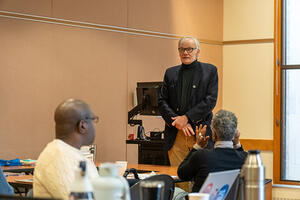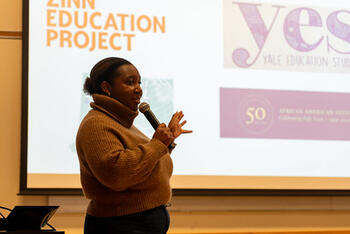The Gilder Lehrman Center Announces the Release of Yale and Slavery: A History and the Yale and Slavery Teachers Institute Program
On Friday, February 16, 2024, the Yale University Office of the President announced the release of the book Yale and Slavery: A History (Yale University Press, 2024). The book is a product of a three-year investigation undertaken by the Yale and Slavery Working Group and research project. The Yale and Slavery Research Project, led by Gilder Lehrman Center Director David Blight (Sterling Professor of History at Yale), received vital assistance from faculty, students, staff, librarians, and New Haven community members. The Gilder Lehrman Center for the Study of Slavery, Resistance, and Abolition (GLC) at the Yale MacMillan Center provided administrative leadership and support. Visit the Yale and Slavery website to learn more about the past three years of the research project.
The book Yale and Slavery: A History is available as a free digital download and for purchase wherever books are sold. Yale University’s website companion to the book provides a detailed chronology of the history explored in the book, along with excerpts from chapters, links to primary sources, and other resources. The website also presents the university’s initial responses to the historical findings and its ongoing commitment to partnerships with the city of New Haven through the Belonging at Yale initiative.
Convened by President of Yale Peter Salovey in October 2020, the Yale and Slavery Working Group was charged with exploring the history of the university in regard to the promotion of “slavery, anti-Black racism, and other forms of exploitation.” In announcing the Working Group, President Salovey explained that Yale has a “responsibility to explore this history, including its most difficult aspects; we cannot ignore our institution’s own ties to slavery and racism, and we should take this opportunity to research, understand, analyze, and communicate that history.”
Authored by David W. Blight, with chapters by Hope McGrath and Michael Morand and a foreword by President Salovey, Yale and Slavery: A History is one attempt to comprehend these aspects of the university’s legacy. As Professor Blight states in the book’s introduction, the in-depth archival work conducted by the Yale and Slavery Research Project team enabled him to write a history that attempts to bring the “haunting shadows” of slavery and its legacies “into the light, to face them, and to expose a past the university has been all too willing to avoid.”
 David Blight notes that the Yale and Slavery book and project is “only the beginning of a much broader history, which we will spread far and wide for the teaching profession.” To that end, as a complement to the book, the Gilder Lehrman Center is pleased to announce the Yale and Slavery Teachers Institute Program. With the full support of the university, the four-year program is designed to enhance current K-12 education in New Haven and New England. This program will help teachers in the region meet new state mandates for incorporating Black and Indigenous history into their curricula.
David Blight notes that the Yale and Slavery book and project is “only the beginning of a much broader history, which we will spread far and wide for the teaching profession.” To that end, as a complement to the book, the Gilder Lehrman Center is pleased to announce the Yale and Slavery Teachers Institute Program. With the full support of the university, the four-year program is designed to enhance current K-12 education in New Haven and New England. This program will help teachers in the region meet new state mandates for incorporating Black and Indigenous history into their curricula.
“No effort that comes from this project is more important than the four-year curriculum education program, which the GLC will lead in the coming years,” Blight commented. The program “will treat teachers like the intellectuals they are, deliver the best history we know, especially in the newly mandated fields of Black, Latino, and Indigenous history, and develop cutting edge pedagogical methods.”

Daisha Brabham, GLC Director of Education and Public Education, will direct this project. The mission of the Yale and Slavery Teachers Institute Program is to enhance history education with a focus on collaborative leaning and anti-racist teaching practices. Working with multiple partners on and off campus, the GLC intends to form a coalition of educators, scholars, community groups, and public history institutions. The primary goal of the Teachers Institute Program, Ms. Brabham states, is to “integrate cutting-edge research into the classroom to transform the teaching of the histories of enslavement, colonial dispossession, abolition and emancipation, and Black and Indigenous communities in New England.” Central to the approach is nurturing the continuous growth of educators both intellectually and professionally, combining scholarship with place-based and community-focused pedagogy.
Through this work, the GLC aims to assist teachers in empowering students to engage deeply with the past, present, and future. Brabham adds that the ultimate aim of the program is to help students to “grasp the profound impact of enslavement and dispossession on shaping New England, and to see the ways African Americans and Indigenous peoples both navigated and challenged these historical paradigms and continue to do so today.”
For each of the first three years of the program, a unique cohort of teachers will engage with partners within and outside of the university community to study content and methods related to a particular theme. Drawing on Yale and Slavery: A History and associated archival materials, as well as a broad range of scholars and sources, the institute will tailor its yearly themes to regional state and Common Core teaching standards. In addition to Yale and New Haven histories, intended topics include Indigenous history, slavery in the north, and Reconstruction and the Black freedom struggle in New England.
Throughout the Teachers Institute Program, members of the community at large will have the opportunity to share in the learning process. Materials and methods created through the program will be disseminated broadly for the benefit of students, educators, and the general public throughout the region. During the final year, interested participants will share their work and ideas with informal educators in locations across New Haven through several capstone events, including a Festival of Teaching and Learning. Using creative, participatory approaches, these events will give families and the broader community a way to learn new dimensions of regional history.
For more information about the program, please contact Daisha Brabham, GLC Director of Education and Public Outreach: daisha.brabham@yale.edu